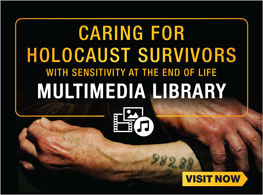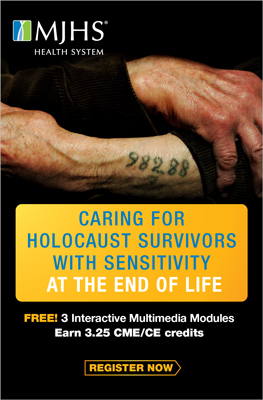Hospice & Palliative Care
ONLINE CONTINUING EDUCATION
Learn Anytime. Earn Credits. Improve Practice.
INTERACTIVE MODULES:
MODULE 3 | BUILDING THE PROPOSAL: INITIAL CONSIDERATIONS

Russell K. Portenoy, MD
Chief Medical Officer, MJHS Hospice and Palliative Care
Executive Director, MJHS Institute for Innovation in Palliative Care
Professor of Neurology and Family and Social Medicine,
Albert Einstein College of Medicine
Bernard Lee, MD
Assistant Vice President of Hospice and Palliative Care
and Senior Hospice Physician
MJHS Hospice and Palliative Care
Attending Physician, Montefiore Medical Center
Teaching Attending, Albert Einstein College of Medicine, Bronx, NY
Myra Glajchen, DSW
Director of Medical Education
Associate Program Director, Fellowship Training Program
MJHS Institute for Innovation in Palliative Care
Jay Gormley, MS
Chief Strategy and Planning Officer
MJHS Health System
Purpose: Palliative care is a therapeutic approach appropriate for all types of serious chronic illnesses, the aim of which is to prevent or manage the suffering and illness burden experienced by the patient and family from the time of diagnosis forward. Specialist palliative care improves patient and family distress, enhances satisfaction with healthcare, improves goal-setting communication, and lowers healthcare utilization. A worldwide movement to improve access to palliative care has been evolving for more than 50 years, and for several decades, the United States has been among the leaders in creating models of care that provide access to specialist palliative care.
In the United States, hospital-based palliative care and home-based hospice care have been established for decades and have helped millions of patients, and their families, cope with the challenges associated with all types of chronic serious illnesses.
Objectives:
1) Explain the purposes of a specialist palliative care program to the various entities that might support its development
2) Illustrate how a focus on varied patient populations may affect program development
Why Do I Need to Know This?
Community-based palliative care—provided in the home by varied types of professionals according to the best practices of palliative care—is only now emerging. There are many challenges to the development and sustainability of these programs. This module is part of a 5-part series, “Creating a High Quality, Sustainable Program in Community-Based Palliative Care”, which was created to provide all those working to change the healthcare system with up-to-date information about palliative care and the elements needed to develop and maintain community-based palliative care programs.
To build and sustain a model of community-based, specialist palliative care, one must be able to articulate its value proposition to varied constituencies—payers, referrers, providers, and patients and families.
Target Audience: administrators, nurse practitioners, registered nurses, advanced practice nurses, registered nurses with a specialty in palliative care/hospice, social workers, and other allied health professionals
Criteria for Successful Completion:
1) Attendance at entire session
2) Submission of completed evaluation form
3) Successful completion of a posttest: 70% passing grade
Continuing Education Credits: 1.0
CE Release Date: July 22, 2019
CE Expiration Date: February 1, 2025 (for nurses); January 31, 2028 (for NYS Social Workers)
Continuing Education Accreditation:
Nurses: The MJHS Institute for Innovation in Palliative Care is approved as a provider of nursing continuing professional development by the Northeast Multistate Division Education Unit, an accredited approver of continuing nursing education by the American Nurses Credentialing Center’s Commission on Accreditation.
Social Workers: MJHS Institute for Innovation in Palliative Care is recognized by the New York State Education Department’s State Board for Social Work as an approved provider of continuing education for licensed social workers #SW-0242.
System Requirements for Computers and Mobile Devices (minimum):
PC: Pentium 1.80 GHz Windows 7, 8; 1 GB RAM; 1024 X 768 monitor resolution; IE 10 IE 11, Safari 5.0, Google Chrome 37 (latest current version) Web browser; multimedia devices (audio speakers, graphic cards)
Tablet: 1.2 GHz processor; iOS 8 (iPad), Android 4.1; Safari (Apple iPad) Google Chrome (Android Tablets)
Fee: Free (includes CE certificate)
Russell K. Portenoy, MD, Faculty and Planner, has indicated a relationship with Tabula Rasa for research support.
Bernard Lee, MD; Myra Glajchen, DSW, and Jay Gormley, MS, have no financial arrangements or affiliations with any commercial entities whose products, research, or services may be discussed in these materials. Any discussion of investigational or unlabeled uses of a product will be identified.
No other Planning Committee Member has any disclosures.
Planning Committee Members
Myra Glajchen, DSW
Kerrianne P. Page, MD, HMDC
Joyce Palmieri, MS, RN, CHPN
Karen Richards, PhD, EdS
Funding Disclosure: This e-Learning Program has been made possible through the generosity of The Milbank Foundation. No commercial funding has been accepted for the activity.
Location: Online at https://www.mjhspalliativeinstitute.org/e-learning/
Our NEW 3-module interactive e-learning course, Caring for Holocaust Survivors With Sensitivity at the End of Life, offers 3.25 CME/CE credits. Select the package option below.
The 5-module interactive e-learning course, Community-Based Palliative Care Program Development, offers up to 6.5 CE credits. Select either the package or the individual module option below.












Caring for Holocaust Survivors With Sensitivity at the End of Life
PACKAGE







